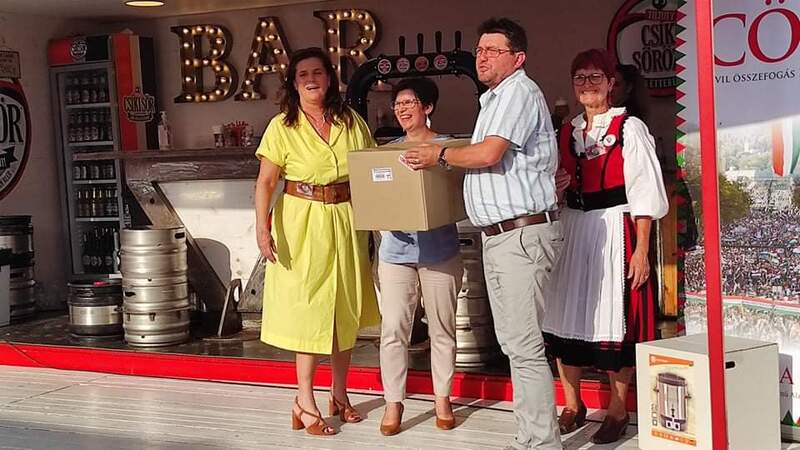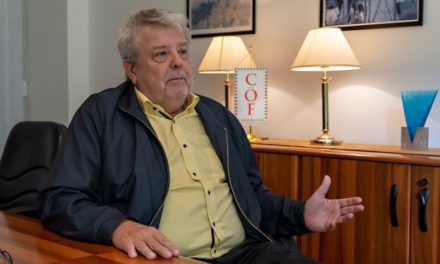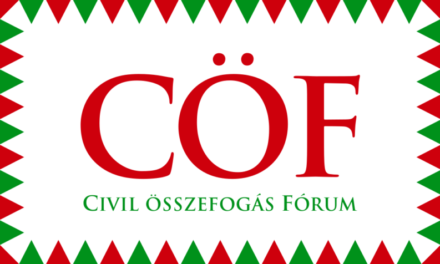After a gap of one year, the Association of Hungarian Women's Interests and the Women's Association of Kézdivásárhely again organized a conference in the heart of Transylvania, in Csíkszentsimon. After the welcome speech by the presidents of the two organizations, Kinga Szőnyi and Magdolna Fülöp interpreted the words of the main patron of the event, Minister of Environment, Water Affairs and Forestry Tánczos Barna, who was unable to personally attend the conference held at the Csíki Beer Manufactory Center due to his official engagement in Bucharest.
The minister expressed his appreciation for the organizers, calling it exemplary that, in addition to their work and family duties, they are able and willing to devote time and energy to community building, organizing interesting, useful and gap-filling events, thus strengthening the threads that connect us invisibly through our culture, through our history and everyday life. According to his conviction, the rational operation of family farms creates the standard of living that will make the young generation stay in the face of the illusion of the promising Western dream. As the minister in charge of the ministry wrote, the conference provides an excellent opportunity to exchange experiences and expand the pool of good practices and ideas.
István Becze , president of the Association of Székely Farmers' Associations in Csíkszereda, gave his presentation together with village farmer Andrea Szász, tender consultant and intern Réka Kelemen. They explained how agriculture has been transformed in the last fifty years, and how innovation processes have appeared today that are completely reorganizing the sector. They also provided information on the registration announced for young farmers, as well as on the communication campaign that the Székely Association of Farmers' Organizations is conducting in order to popularize the agricultural profession.
The Budapest dr. András Tibor Cseh , the general secretary of MAGOSZ, presented how a family farm works in the mother country. As he said, 80% of the rural development funds are available for the micro-SME sector, which is why a significant portion of the funds go to family businesses. Another novelty is that a new legal status has become available to family businesses in Hungary, the form of the "family agricultural company", which provides them with additional benefits, but also serves the purpose of encouraging individual entrepreneurs to set up their own company, since the property liability becomes more limited and financing options open up.
Csaba Könczei , a representative of the Romanian Parliament and a member of the agricultural committee of the House of Representatives, pointed out that there is a lot of debate between agricultural experts, farmers, farmers, opinion makers and media actors about which form of production best suits the agricultural structure and characteristics of Székelyföld: the small and medium-sized traditional family farms, forms of association or large-scale industrial agricultural production featuring modern technology. He encouraged the maintenance of backyard farms, which is much needed in Székelyföld and other regions as well.
from Sándor Sterczer , a hand-dissenter artisanal cheese maker, as a practicing family entrepreneur, that they work with a master producer's license, that all members of the family participate in the work, which is necessary, because they do all the work themselves on their farm, from animal care to feed production right up to cheese making.
Stefánia Kurkó , a mother of a large family and a vegetable producer, gave a presentation about the mixed-culture "high-bed empire" that she created with the help of her husband in Csíktaplocá, which is constantly marveled at by those interested, and thanks to which she can supply her family with her own vegetables almost all year round.
Dr. Dávid Mezei, director of EU agricultural support at the Budapest Savings Bank, analyzed the expected future of European family farms in the light of the European Green Deal. From the point of view of the future of family farms in the Carpathian Basin, it is a fundamental question how they can meet the challenges/requirements of the new Common Agricultural Policy starting in 2023, as climate and environmental protection and animal welfare aspects are increasingly being defined, but there is also an increasing demand for quality food production demand. The Brussels proposals will not only make agricultural activities more difficult, but may also significantly increase production costs, so that European products will have to deal with ever-increasing international competition. It will also be a big challenge to comply with the strategic elements aimed at achieving climate neutrality by 2050, in which e.g. the use of pesticides should be reduced by 50 percent and the use of fertilizers by 20 percent, while the proportion of areas affected by organic farming should be increased from 8 to at least 25 percent by 2030.
Sinka Arnold , the vice-president of the Székelyföld Mangalica Breeders' Association, who herself breeds mangalicas in Nyikómalomfalva, informed those present about the role of digitization, which is now indispensable in establishing European relations and sales chains.
János Ferdinánd, horticultural engineer from Csíkmadaras, owner of Garden Proiect Kft., emphasized the importance of innovation and science, which must appear as essential tools in the 21st century. in 20th century family farms in order for them to stand their ground on international markets, i.e. to be competitive.
István Gergely , the president of the Csibészek Foundation in Csikszereda, gave a lecture about the three decades of work, thanks to which he helped hundreds of young people who grew out of the orphanage find jobs and apartments, and reintegrate into society, thus staying in their homeland and thriving there.
At the end of the conference, thanks to the initiative of the CÖF-CÖKA and the Association of Hungarian Women's Interests Zsuzsa Máthé , president of the Association of Carpathian Basin Family Organizations, was able to receive a donation of a homemade canning machine .
Photo: Association of Hungarian Women's Interests












